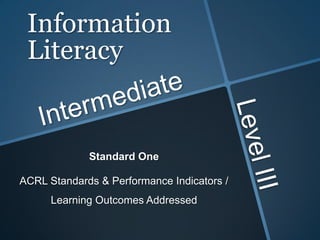
Information Literacy Standard 1 Level 3
- 1. Information Literacy Standard One ACRL Standards & Performance Indicators / Learning Outcomes Addressed
- 2. Standard One is the foundation on which the other Standards will build.
- 3. The student must be able to identify these questions: What is it you want to know?
- 4. The student must be able to identify these questions: What is it you want to know? What kind of information do you need?
- 5. The student must be able to identify these questions: What is it you want to know? What kind of information do you need? How much information do you need?
- 6. This standard is divided into 4 performance indicators. The basic concepts of these performance indicators are: Define and Articulate
- 7. 1. The information literate student defines and articulates the need for information.
- 8. Use background sources relevant to specific disciplines Consult with course instructor and/or librarian to identify and focus a research topic Identify key concepts that describe the information need
- 9. 2. The information literate student identifies a variety of types and formats of potential sources for information.
- 10. Describe the difference between the general and the subject-specific information sources Distinguish the characteristics of resources for different audiences (current vs. historical; popular vs. scholarly)
- 11. Explore subject-specific information resources Identify characteristics of primary and secondary sources Explore raw data from original research and surveys
- 12. 3. The information literate student considers the costs and benefits of acquiring the needed information.
- 13. Demonstrate a general knowledge to broaden the information seeking process beyond the local resources in the library.
- 14. 4. The information literate student reevaluates the nature and extent of the information need.
- 15. Revise the scope of the topic based on the amount of information found.
- 16. The 4 Performance Indicator Outcomes ACRL Outcome 1.D
- 17. Outcome Example: Your students are having trouble defining their research topic. This is where the ACRL outcomes become important. ACRL Outcome 1.D
- 18. Outcome 1.D asks the student to: Define or modify the information need to achieve a manageable focus.
- 19. Outcome 1.D asks the student to: Identify an initial question that might be too broad or narrow, as well as one that is probably manageable.
- 20. Outcome 1.D asks the student to: Explain his/her reasoning regarding the manageability of a topic with reference to available information sources.
- 21. Outcome 1.D asks the student to: Narrow a broad topic and broaden a narrow topic by modifying the scope or direction of the question.
- 22. Outcome 1.D asks the student to: Demonstrate an understanding of how the desired end product (i.e., the required depth of investigation and analysis) will play a role in determining the need for information.
- 23. Outcome 1.D asks the student to: Use background information sources effectively to gain an initial understanding of the topic.
- 24. Outcome 1.D asks the student to: Consult with the course instructor and librarians to develop a manageable focus for the topic.
- 25. Bibliography "Information Literacy Resources | Association of College and Research Libraries (ACRL)." ALA | Home - American Library Association. http://www.ala.org/acrl/issues/infolit "Objectives for Information Literacy Instruction: A Model Statement for Academic Librarians | Association of College and Research Libraries (ACRL)." ALA | Home - American Library Association. http://www.ala.org/acrl/standards/objectivesinformation. "Standard One | Association of College and Research Libraries (ACRL)." ALA | Home - American Library Association. http://www.ala.org/acrl/issues/infolit/standards/stnd1. "The Standards: Step-by-Step | Association of College and Research Libraries (ACRL)." ALA | Home - American Library Association. http://www.ala.org/acrl/issues/infolit/standards/steps. Compiled by: Denise Watts, MLS – Baptist College of Florida